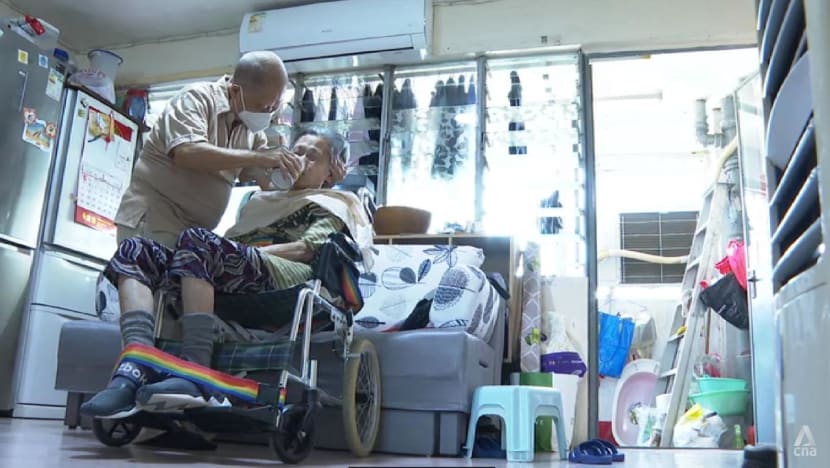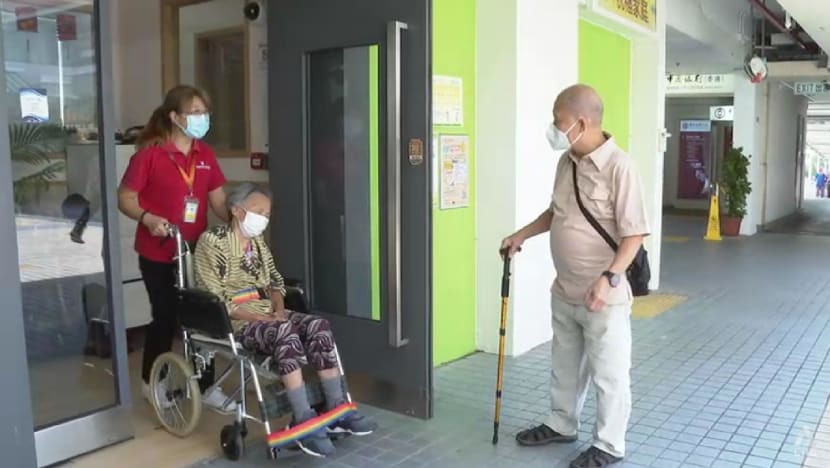Illness, isolation and suicidal thoughts: Hong Kong’s senior caregivers struggle through COVID-19
More caregivers are signing up for day care services, as self-financed centres step up to the challenge after government-run ones scaled down capacity earlier this year at the peak of the city’s fifth COVID-19 wave.

73-year-old caregiver Pun Sum Wing prefers caring for his wife, a dementia patient, on his own instead of depending on his children as they have families of their own. (Photo: CNA/Ken Cheung)
HONG KONG: There’s a short flight of steps leading to their house.
But to 73-year-old Pun Sum Wing, it takes some effort getting his wife, a wheelchair user, around. So he built a wooden ramp, complete with rubber strips, to wheel her in and out of the house.
It’s a steep incline and his wife, Law Mui, needs assurance. Mr Pun gently comforts her and within a few moments, they’re home.
Mrs Pun has dementia and is unable to move on her own, so Mr Pun bathes and feeds her. It’s a familiar routine; one that the couple has been following for most of the past decade.
“It’s my responsibility to take care of my wife. I don't want to bother my children as they’re working and need to take care of their own families,” he said.
Mr Pun is among a rising number of elderly caregivers in Hong Kong.
According to a recent study, 60 per cent of caregivers are at least 61 years and above, and almost 45 per cent of them care for seniors aged 81 years and above.
The study by Carer EPS, a local platform that caters to caregivers, surveyed more than 1,600 respondents from August 2020 to January this year.
WHEN THE CAREGIVERS NEED CARING
The social shift may be expected in the ageing city, but when the caregiver needs caring, it can be hard to cope.
When Mr Pun found out that he was sick, he wanted to end both his and his wife’s lives, making them part of the statistics.
Hong Kong’s elderly suicide rates hit a record-high last year at 446 cases, accounting for 44 per cent of the city's overall suicide cases.
“I was diagnosed with late-stage prostate cancer just as my wife’s situation turned serious. I was so worried that I couldn't take care of her anymore, so I thought of committing suicide with her,” Mr Pun said.
“Later I realised that I couldn’t decide for her, because she’s unable to express herself.”
Beyond the stress of caregiving, Mr Pun is suffering from isolation, worsened by the pandemic.
“Since the pandemic started, I have no social life at all. I’m afraid of bringing back the virus home to my wife,” Mr Pun said, echoing the anxieties of many in his age group.
Turning to old age residential homes isn't a viable alternative either.
During Hong Kong’s fifth COVID-19 wave earlier this year, outbreaks and deaths in these homes deterred families from admitting their loved ones there.
“Families are also concerned about the restricted visiting arrangement, when they apply for a spot in a care home,” said Ms Grace Li, chief executive of Altru Nursing Home.
“If we don’t allow them to visit in person, they’d rather stay home and take care of their loved ones themselves regardless of how exhausting it is.”
DEMAND FOR RESPITE CARE SERVICES
More caregivers like Mr Pun are signing up for day care services instead.

Self-financed day care centres are stepping up to the challenge, since government-run ones scaled down capacity earlier this year at the peak of the city’s fifth COVID-19 wave.
“We always encourage our caregivers to rest, but it is easy to say, not easy to do. Our centre allows caregivers to drop off their loved ones at any time. They can just give us a call,” said Maggie Siu, service head of Integrated Elderly Services at Baptist Oi Kwan Social Service.
There, seniors get to socialise and do light exercises, while caregivers are reminded that they aren’t alone.
"When we couldn't go out during the restrictions, Baptist Oi Kwan organised some online gatherings and workshops for us. I found the mindfulness training and art therapy very relaxing. I was asked to draw anything that came to mind, to express my stress,” Mr Pun said.
The couple lives a short walk away from the centre, where Mrs Pun goes three times a week.
For Mr Pun, who used to spend more than 80 hours a week caring for his wife, it’s a much needed breather.
"At least I am more comfortable and happier now. I can have breakfast and drink afternoon tea at any time. I can even go for walks,” he said.
LABOUR CRUNCH
Rising demand for respite services, however, is putting a strain on non-governmental organisations (NGOs).
“Some of our services have already reached their maximum capacity. There is a waiting list for our service and we have to hire more staff. But we are encountering some difficulties, like emigration,” Ms Siu said.
Hong Kong is experiencing an emigration wave, made worse by border restrictions and the political turmoil of 2019. According to official data, 113,000 people left the city over the past year.
Many in the care industry have also been deployed to vaccination centres.
“We are doing many outreach programmes to get young people to experience working in social welfare services,” Ms Siu added.
Her organisation is also calling for more support to help NGOs serve clients better.
"If the government can provide more subsidies for the day care service fees, land rent and administrative expenses of the centre’s operation, it will help many caregivers and their families,” she said.
Mrs Li, who sits on the committee of Hong Kong’s Elderly Commission, suggested throwing in incentives.
“We hope the government can give the occupational allowance directly to the employees instead of us, so as to encourage the newcomers to join the industry,” she said.
For senior caregivers like Mr Pun, who’s living on borrowed time, a little goes a long way.
“If you want to stay beside your loved ones longer, you must learn how to let go and rest. You've got to be strong before taking care of the others."
Watch CNA Leadership Summit live on 10 October 2022 from 1.30pm SGT via cna.asia/leadership-summit.
Where to get help:
National mental health helpline: 1771
Samaritans of Singapore Hotline: 1767
Singapore Association for Mental Health Helpline: 1800 283 7019
You can also find a list of international helplines here. If someone you know is at immediate risk, call 24-hour emergency medical services.














